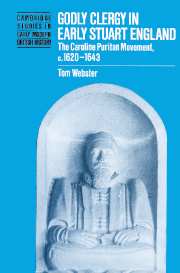Book contents
- Frontmatter
- Contents
- Acknowledgments
- List of abbreviations
- Introduction
- Part I Society, clerical conference and the Church of England
- Part II The godly ministry: piety and practice
- Part III ‘These uncomfortable times’: conformity and the godly ministers 1628–1638
- 7 Thomas Hooker and the conformity debate
- 8 Trajectories of response to Laudianism
- 9 The ecclesiastical courts and the Essex visitation of 1631
- 10 Juxon, Wren and the implementation of Laudianism
- 11 The diocese of Peterborough: a see of conflict
- 12 The metropolitical visitation of Essex and the strategies of evasion
- Part IV ‘These Dangerous Times’: the Puritan Diaspora 1631–1643
- Index
- Cambridge Studies in Early Modern History
10 - Juxon, Wren and the implementation of Laudianism
Published online by Cambridge University Press: 04 November 2009
- Frontmatter
- Contents
- Acknowledgments
- List of abbreviations
- Introduction
- Part I Society, clerical conference and the Church of England
- Part II The godly ministry: piety and practice
- Part III ‘These uncomfortable times’: conformity and the godly ministers 1628–1638
- 7 Thomas Hooker and the conformity debate
- 8 Trajectories of response to Laudianism
- 9 The ecclesiastical courts and the Essex visitation of 1631
- 10 Juxon, Wren and the implementation of Laudianism
- 11 The diocese of Peterborough: a see of conflict
- 12 The metropolitical visitation of Essex and the strategies of evasion
- Part IV ‘These Dangerous Times’: the Puritan Diaspora 1631–1643
- Index
- Cambridge Studies in Early Modern History
Summary
Archbishop Abbot died on 4 August 1633. It came as no surprise that William Laud was to be translated to Canterbury, a nomination of which he was informed within two days. On 6 August 1633, Francis Kirby informed John Winthrop, ‘For domesticke newes it is bad. The bishop of Canterbury died the last saboth day, & his place (as I hear) the kinge hath bestowed upon the bishop of London.’ It was less clear who was to succeed him at Fulham Palace: court sources believed Matthew Wren and the Bishop of Oxford, John Bancroft, to be the front runners, with the Bishop of Bath and Wells, William Pierce, to be another candidate. In the event, on 23 September the nomination went to William Juxon, until January the president of St John's College, Oxford, Laud's college. Since July, Juxon had been clerk of the King's closet, the royal confessor, and when he received his nomination for London, he was bishop elect of Hereford. Bearing in mind that each Archbishop of Canterbury since Whitgift had been translated directly from London, this was a fairly meteoric rise. Juxon was clearly the new archbishop's nominee: he recorded in his diary that he had secured Juxon's appointment so that he ‘might have one that I trust near his majesty, if I grow weak or infirm, as I must have a time’. Juxon's Arminianism is rather more assumed than evident, but it is certainly accurate to describe him as Laudian.
- Type
- Chapter
- Information
- Godly Clergy in Early Stuart EnglandThe Caroline Puritan Movement, c.1620–1643, pp. 204 - 214Publisher: Cambridge University PressPrint publication year: 1997



